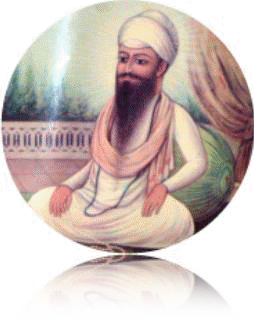namdhari world
Main menu:
- Home Page
- Kuka Faith
- History
- Sikh Gurus
- Namdhari Gurus
- Freedom Fighter - Satguru Ram Singh Ji
- Warrior of Peace
- Non-Cooperation Movement page 1
- Non-Cooperation Movment page 2
- Kuka Postal Service
- No Trial
- Battle for recognition as part of India's struggle for freedom
- Plaque at Ludhiana Railway Station
- Ram Singh Kuka by G.K.Venkateshamurthy
- Social Reforms by Satguru Ram Singh Ji
- Birth of Sant Khalsa
- Kuka Movement - by Film division of Government of India
- KUKA LEHAR - India's first war for independance (1856)
- Satguru Jagjit Singh Ji
- Contradictions
- Historical Quotes
- Vaisakhi - 1699
- Gurmukhi Script
- Sikh Women
- Knowlegde Bank
- Connections
- Places to visit
- Resources
- Music World
- Calendar
- Sports
- ETC...
Guru Amar Dass Ji
History > Sikh Gurus
Avtar Or Parkash Diwas: Vaisakh Sudi 14 1536 Bikrami
Date of Birth: May 5, 1479
Place of Birth: Village Basarke (Amritsar)
Gurgaddi Diwas: 3 Vaisakh 1609 Bikrami (29.3.1552) Khadur Sahib
Joti Jot Diwas: Asu 2, 1631 Bikrami (1.9.1574) Goindwal
Father: Shri Tej Bhan Jee Mother: Mata Lakhshmi Jee
Wife/Wives: Mata Mansa Devi (married 1502)
Children: Sh. Mohan Jee, Sh Mohri Jee, Bibi Bhani Jee & Bibi Dani.Jee

The third Guru, Shri Guru Amardas Ji, was born in 1479. Guru Amar Das Ji was born in a village in Amritsar called Basarke Gillan. Guru Amar Das Ji became the Guru at the age of 73. This was a result of his service and devotion to Guru Angad Dev Ji. He met Guru Angad in 1540 who transmitted the same Light to Guru Amardas in 1552. Once Guru Amar Das Ji heard Kirtan from Bibi Amro Ji (Guru Angad Dev Ji's daughter). He went to Khadur Sahib immediately and under the impact of the teachings of Guru Angad Dev Ji, adopted him as his spiritual guide. From then on, he would rise early in the morning and bring water from the Bias river for Guru Ji's bath and fetch wood from the jungle to prepare "Guru Ka Langar".
Guru Amardas took up cudgels of spirituality to fight against caste restrictions, caste prejudices and the curse of untouchables. In order to bring the Sikhs closer to one another, he ordained that they must assemble on the occasion of Diwali, Baisakhi and Maghi.
The Guru started a new centre of worship at Goindwal where he got a well dug for the benefit of the people. He located the site for Amritsar and directed Guru Ramdas to construct the Holy Tank there.
He strengthened the tradition of the free kitchen, Guru Ka Langar (started by Guru Nanak), and made his disciples, whether rich or poor, whether high born or low born (according to the Hindu caste system), have their meals together sitting in one place. The Guru was very friendly with Emperor Akbar who came to pay respects to him at Goindwal and according to the custom took meals at the langar. After experiencing "Guru Ka Langer", Akbar offered Guru Ji some royal property in which to serve the Langar but Guru Amar Das Ji declined politely, instead persuaded Emperor Akbar to waive pilgrims tax on all non-Muslims crossing Yamuna and Ganga rivers. He thus established social equality amongst the people.
Guru Amardas disapproved of sex discrimination. He also completely abolished amongst the Sikhs, the custom of Sati, in which a married women was forced to burn herself and die with the funeral of her husband. The custom of Paradah, in which a woman covered her face with a veil was also done away with. He advocated widow re-marriage.Guru Amar Das Ji introduced new birth, marriage and death ceremonies. Thus he created a fence around the infant Sikhism.
For spreading sikhism to all regions of India, he appointed a devout Sikh in charge of each region. The total number of such dioceses was 22. Guru Amardas appointed women too to conduct Sikh missionary and parish work. Districts under the charge of men were known as 'Manjian'. Those in the charge of women were known as 'Pirhian', on which they sat to minister to the disciples. Their selection shows yet one more way in which Guru Amardas conferred the equal status between men and women.
Guru Amar Das Ji constructed Baoli Sahib at Goindwal Sahib with 84- steps and made it a Sikh pilgrimage centre for the first time in the history of Sikhism. He also composed 869 verses including the 'Anand Sahib'.
Guru Amar Das Ji did not consider his sons fit for Guruship and instead chose his son-in-law Guru Ram Das Ji to succeed him. This practice shows that Guruship could be transferred to anybody fit for the Sikh cause not just to a particular blood line or family. Guru Amar Das Ji passed on the responsibility of Guruship to Guru Ram Das Ji before passing away at the age of 95.
Guru Nanak Dev Ji / Guru Angand Dev Ji / Shri Guru Amardas Ji / Shri Guru Ramdas Ji / Shri Guru Arjan Dev Ji / Shri Guru Hargobind Sahib Ji / Shri Guru Har Rai Ji
Shri Guru Har Krishan Ji / Shri Guru Tegh Bahadur Ji / Sri Guru Gobind Singh Ji / Sri Guru Balak Singh Ji / Sri Guru Ram Singh Ji / Sri Guru Hari Singh Ji
Sri Guru Partap Singh Ji / Sri Guru Jagjit Singh Ji